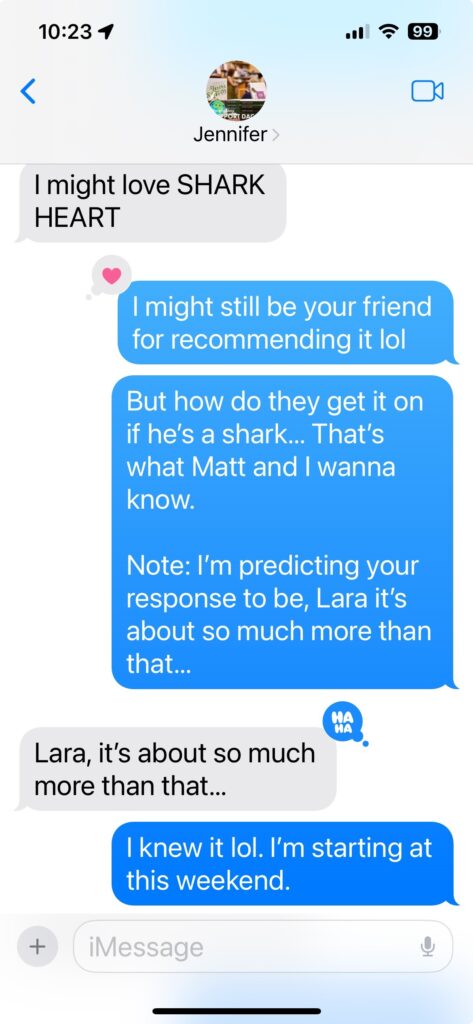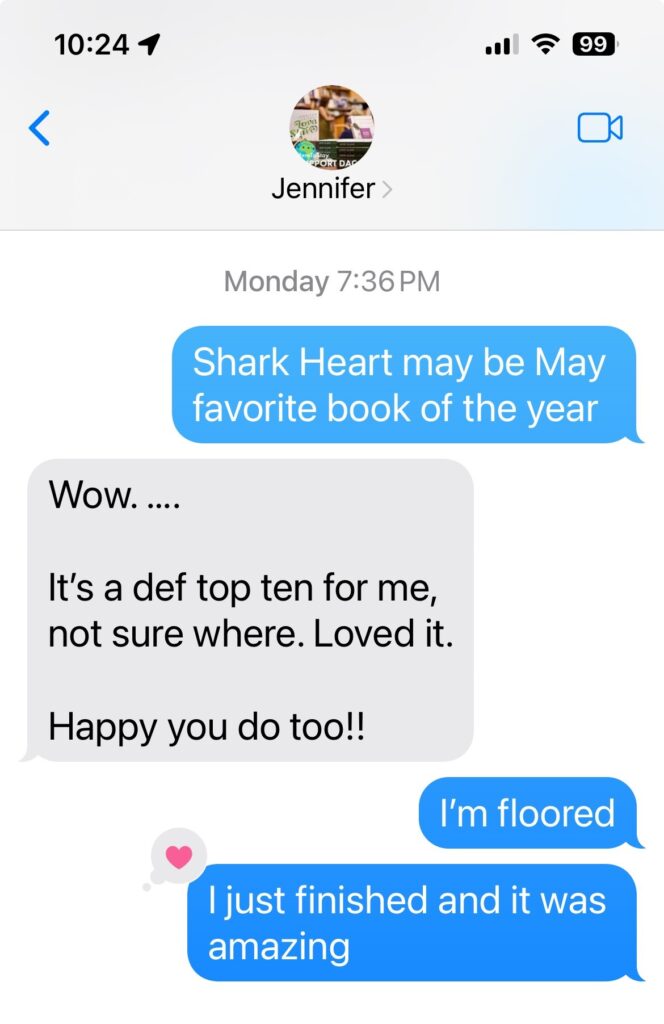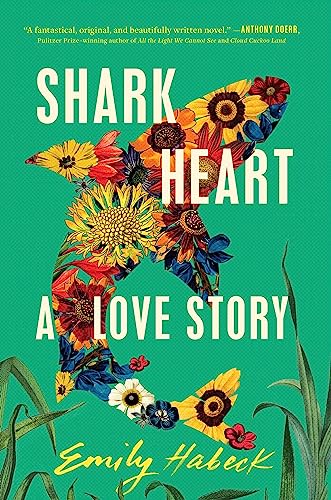Shark Heart: Our Longstanding Fear of Great Whites Caused By Early Trauma (JAWS)
Snotty Literati ventured into unsafe waters, so to speak, with Emily Habeck’s debut, Shark Heart: A Love Story. Why unsafe? IT’S LARA! She’s not a fan of, um, Magical Realism (a literary style that is kinda mostly realistic but elements of magic are thrown in for fun–maybe most notably, Gabriel García Márquez). In this, people, well, “morph” into animals due to a rare diagnosis. A pair of newlyweds, Lewis and Wren (ironic name, but hints at the prettiness of the language), experience this despair when Lewis is diagnosed–and spends the bulk of this novel transforming into a Great White. Habeck is new on the scene (and young: JENNIFER IS JEALOUS. IT’S HER!)
Jennifer: You hate this kind of stuff. You just said that you dislike that “suspend your disbelief” thing. Why did this, if it did, work for you?
Lara: Let’s go back a bit. I had heard about Shark Heart earlier this year as a “Book on the Radar” from a few of the bookish podcasts I listen to. Of course, when I heard what it was about… a newly married man turns into a Great White Shark during his first year of marriage… I was like, well, THERE’S a book I can skip. I mean, the ocean freaks me out. I do not like sharks, and sci-fi/fantasy/magical realism, no thanks.
I kept seeing the beautiful floral cover on social media. I probably love flowers as much as I hate and fear sharks. This was becoming a real problem.
Jennifer: Yeah, that cover is stellar.
I will say that I don’t love sci fi or fantasy, either. Magical Realism always sounds a bit more, um, literary? (Uh-oh. Sounding snobby again.)
Lara: And then YOU, of all people, told me you were reading it when we met up to review Tom Lake. We talked about it, and I decided to take the bait and picked up a copy because, if I am going to read this book that I am probably going to hate, I’d at least better have the gorgeous hardcover. I mean, it is stunning.
Then I get this text from you.

At first glance, this book is not my jam. In fact, I should put my wallet back in my purse and walk out of the bookstore with all copies of Shark Heart comfortably perched on the shelf for those who will appreciate it, because it won’t be me.
And then I started it and COULD. NOT. PUT. IT. DOWN.
WHAT in the beautiful and compelling WHAT was I reading?
And then I sent you this text (forgive the may/my typo… I was excited):

Jennifer: I have to admit that this really worked for me. I’m trying to figure out why. My big reason is probably that the writing is actually fabulous, like super impressive. I would recommend reading a paper copy, rather than listening to the audiobook, because I think the book is set up in a visually beautiful way. Why, do you think, this is subtitled “a love story”?
Lara: I am in the same boat (and I am really not trying to be so full of puns). I think what worked for me is that Habeck’s writing is remarkable. It draws you in. And outside of this bizarre phenomena where people can have this genetic mutation that has them transition from a human into an animal, the rest of the action, plot, activities of the book are so every day… so mundane.
I think she subtitles it a love story because, at the heart of the book (which I think is really Wren’s story), it is about love. The ability to love someone through our own fear and insecurities and through the pain of change and transformation that can cause you to lose that person. In this book, that transformation takes an unrealistic form, but it’s no different than the profound loss we can experience when people change beyond our recognition.
“The main ingredient in transformation was not magic. It was pain.”
How true is that? And here are some other quotes that stood out to me:
Regarding Wren’s teenaged mother Angela:
“They couldn’t kick a girl out of high school for being pregnant, but they could certainly drill a hole through her spirit.”
Oof! And this one, during Lewis’s transition:
“Feelings fled under pressure; feelings did not light the darkness. What remained strong in the deep, hard times, was love as an effort, a doing, a conscious act of will.”
Beautiful…
Jennifer: I do think it’s very valid to question what this book is about. Is it enough to be pretty?
No. It is not enough. And I have thought a lot about this. Art for Art’s Sake. Just beautiful?
It’s not enough. And the thing that makes this book work is that it’s more than JUST pretty prose: it’s redemptive, sweet, and happy. We don’t want to give away too much. But I think readers should read it.
Lara: I totally agree. Readers need to read it. In addition to beautiful prose, Habeck employs an interesting structure to her storytelling. She intermixes standard narrative, poetry, and playwriting. As the story progresses, sections get shorter, white space on the page increases. Some chapters are a single sentence. What did you think of this? Did you like it?
Jennifer: I was hooked. I think I got caught up in the author’s talent, frankly.
Lara: How she architected the book definitely drives interest, makes it quick to consume. I felt the pacing and spacing and the greater expanse of white space matched the depths of space, openness and emptiness in the ocean that Lewis is now a part of.
Jennifer: You’re a little brilliant for making that comparison between the ocean and the look of the prose. I do want to show some of these fabulous prose moments.
A passage about Wren’s mother, who plays a very important role in the story:
“Angela’s future felt so full, and her parents existed another life ago, ghosts relieved from the duty of haunting.”
Also about Angela:
“Talking to anyone but him was like trying to speak with a mouthful of molasses, and Angela realized her whole life had been molasses.”
I love this thought of Wren’s because I think I’ve literally seen some of the most beautiful landscapes in this place:
“Utah tries so hard, she thought. Its geographical insecurity was so obvious: each big orange rock trying to outdo the one that came before it. Flamboyant, over-the-top features to disguise an otherwise arid and bereft landscape.”
NOT FAIR, EMILY! THOUGH YOU WRITE BEAUTIFULLY!
You’ve also pointed out in conversation some of the themes found in the book. Is it touching upon our abilities to survive childhood trauma, adult trauma? Is it speaking about how love is NOT self-serving? There are two big examples in this book: George and Wren. We haven’t discussed George, but we do get a backstory about Wren’s mother, Angela. George is part of her story. And he is clearly not self-serving. Wren learns a great deal about love.
Lara: I love love loved George! What a gem he was to Angela, to Wren. He’s an example of the empathy and caring that exists in humanity. I think, at the heart of this book, is hope and optimism. That our lives can throw us curve balls (devastating plot twists) and we can adapt. Our resiliency can be stronger than the thing we are dealing with. It certainly was in Wren’s case.
Jennifer: Oh! I have to mention another once-human-now-shark in the book: Margaret T. Finnegan. We meet her at the end. I think, in other hands, readers could easily not like this creature or her motives or her addition to the story. But Habeck makes us feel endeared, hopeful. That’s really a gift.
Lara: Yes, Margaret T. Finnegan (who requests being addressed with her full name) was a gem and just the right shark for this story.
Jennifer: I don’t mind saying that this book will be in my TOP TEN 2023 READS, maybe TOP FIVE, maybe TOP THREE. Maybe TOP TWO. Unless you stop me from saying it, my money is on James McBride’s latest for (my) NUMBER ONE. What have you been reading?
Lara: Right now, with about six weeks left in 2023, Shark Heart is my number one for the year and I predict it will stay there. Since we last met, I have read two great memoirs, All Boys Aren’t Blue by George M. Johnson and The Many Lives of Mama Love: A Memoir of Lying, Stealing, Writing, and Healing by Lara Love Hardin. I also read Lauren Groff’s The Vaster Wilds (which I didn’t love) and Benjamin Stevenson’s Everyone in My Family Has Killed Someone which was as fun and wild as the title suggests. What about you?
Jennifer: I recently read Harrison Scott Key’s terribly perfect memoir, How To Stay Married. I feel a bit as if he is the kind of writer I’d like to be. I read a little Jill Duggar, a little Bill Bryson. I recently finished Charles Baxter’s The Sun Collective, which was okay. I bought Barbra Streisand’s new memoir on audio and it’s over forty-eight hours–so we might say that Barbra is trying to kill me. I’m currently reading The Museum of Failures by Thrifty Umrigar. Good, so far.
Next Time!
Our Best and Worst of 2023 will be out near the year’s end, quickly followed by our thoughts of Nathan Hill’s sophomore effort, Wellness.
Until then, happy reading!

